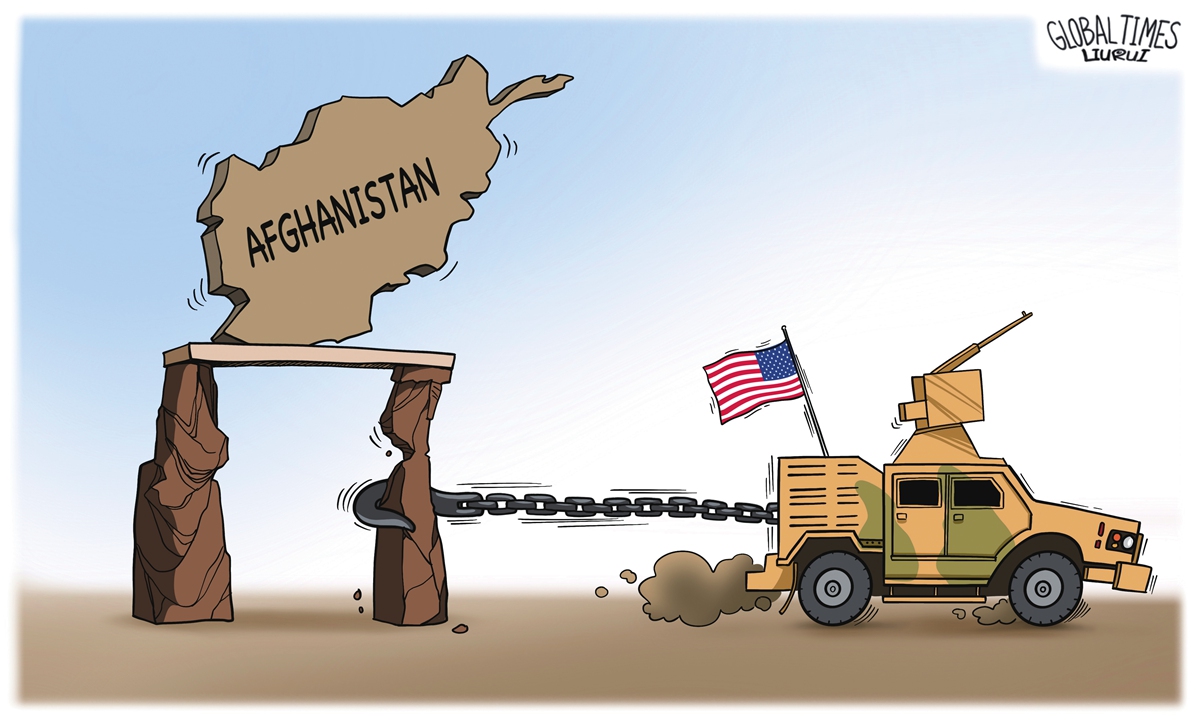
Illustration: Liu Rui/GT
Voice of America on Friday published an article entitled, "Who Will Be the First Country to Recognize the Taliban?"
The Taliban's quick takeover of Afghanistan has already heavily humiliated the US in terms of politics. At this moment, the US is reluctant to see any country immediately recognize the Taliban, which will be another setback in diplomacy for Washington. In this context, the US, as well as its Western allies, is particularly concerned about who will be the first to recognize the Taliban.
The US and the West are also anxious that countries that first recognize the Taliban will fill the so-called power vacuum created by the hastened withdrawal of their troops, which will impact their interests in the region. They are wary of plans by China and Russia, the two major rivals of theirs. The US and the West are worried that the potential expanding influence from China and Russia will supposedly pose a big geopolitical challenge.
EU Foreign Affairs Chief Josep Borrell said on Thursday that "What we cannot do is to let the Chinese and Russians to take control of the situation [of Afghanistan]," according to AP News.
"The US and the West have always measured others' corn by their own bushel, especially when it comes to the potential moves by China and Russia in Afghanistan," Xin Qiang, deputy director of the Center for American Studies at the Shanghai-based Fudan University, told the Global Times on Sunday. He continued, "The US and the West are self-serving. They did not sincerely and truly commit to the welfare of the Afghan people or the peace and stability in Afghanistan. If they did, they would have been supported and respected by the Afghan people. But why have we seen their defeat in Afghanistan?"
The US and its European allies have political ambitions in Afghanistan. Their involvement in the country was to penetrate their influence in Central Asia and enable them to redraw the political and economic map of the world. Currently, they judge China's move according to their own patterns, groundlessly considering China's engagement with Afghanistan out of selfish intent. These are old tricks by the US and the West.
The fact is that every country behaves differently from each other. Xin said that China, as a responsible power, has different priorities in Afghanistan in comparison to those of the US and the West. Beijing will provide assistance within its own capacity to prevent humanitarian crises, and ensure that Afghanistan have a stable and responsible governance, rather than geopolitical calculations.
Compared with countries outside the region, such as the US and some European countries, China is more willing to see a prosperous and stable Afghanistan. This will be positive for all regional countries.
In response to Borrell, Leonid Slutsky, chairman of Committee on International Affairs of Russia's State Duma, said on Thursday that, "All that the world community should be concerned about at the moment is general security, stabilization in Afghanistan and the prevention of a new humanitarian catastrophe, which is already beginning to unfold before our eyes. And it is certainly not the time now to engage in redrawing the political map of the world," according to the official website of Slutsky.
What Slutsky said is exactly what the international community needs to do in face of the power transition in Afghanistan. In the past two decades, the US, under the banner of counterterrorism, has brought inestimable damage to Afghanistan. It is hoped that the US and the West can seriously reflect on this and stop inflicting more sufferings on the Afghan people.




